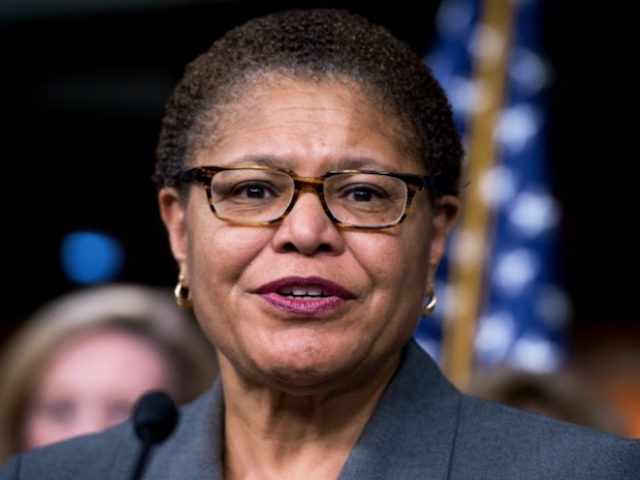Joe Biden’s campaign has added a new name to its vice presidential shortlist—that of Rep. Karen Bass (D-CA), the chairwoman of the Congressional Black Caucus (CBC).
On Tuesday, CBS News reported that Bass, who has led the CBC since last year, is being vetted as a potential running mate for the presumptive Democrat nominee. Bass’s late addition to Biden’s vice presidential shortlist comes as the lawmaker has been tasked by Speaker Nancy Pelosi (D-CA) with drafting national legislation on policing reform in the wake of George Floyd’s death. The congresswoman was tapped for the role, in part, because of her longstanding efforts to bolster community oriented solutions to crime and violence.
Bass’s last minute inclusion in the vetting process seems to signal that Biden’s campaign is keeping its options open.
Biden, who has promised to make history by picking a woman as his vice presidential nominee, has stoked speculation on the topic in recent weeks. First, the presumptive nominee asserted that whomever he chose would have to be “ready to be president on a moment’s notice.” Then, Biden followed up by having allies hint publicly about who was on the shortlist before he finally announced that a decision would be unveiled by August.
“We’re in the process of deciding the basic cut, about whether or not they really want it. Are they comfortable? They’ve asked a lot of questions,” the former vice president told donors recently.
Despite Biden’s attempts to make the process seem cut and dried, behind the scenes his campaign has struggled with whom to pick.
The problem is ideological. Biden campaigned as an unabashed moderate who often lambasted his progressive rivals, most notably Sens. Bernie Sanders (I-VT), and their policies, like Medicare for All. As such, many believe that if the former vice president were to pick someone outside the Sanders faction, he would risk alienating progressives ahead of the general election.
Party unity, however, is not the only complication. If Biden has any hopes of ousting President Donald Trump from the White House in November, he will need to energize one of the Democrat Party’s main constituencies—black voters.
Most Democrat strategists point to a drop-off in black turnout between 2012 and 2016 as the primary reason for former Secretary of State Hillary Clinton losing to Trump.
During that race, Clinton received 88 percent of the black vote, according to exit polls. Although impressive, the numbers were significantly lower than the 93 percent former President Barack Obama garnered on his way to reelection in 2012.
The drop-off was most significant in Michigan, Pennsylvania, and Wisconsin – all states that went narrowly for Trump that election after having backed Democrats at the presidential level for nearly three decades. For example, data from the Michigan secretary of state’s office indicate Clinton received 75,000 fewer votes in Wayne County—where Detroit is located—than Obama did in 2012. Even though Clinton still won the county by a substantial margin, the decrease in support ensured Clinton lost the state to Trump, who made strong inroads with white working-class voters, by more than 10,000 votes.
Many believe that if black turnout was the same in 2016 as it was in 2012, Clinton would have won the presidency, despite Trump’s populist appeal to blue-collar whites. Given that fact, and recent surveys showing Biden underperforming Clinton among black voters, many Democrats are pushing the former vice president to pick a woman of color as his running mate.
Biden, himself, seems to agree, with allies claiming in recent weeks that Sen. Kamala Harris (D-CA) and Rep. Val Demings (D-FL) had catapulted to the top of the vice-presidential sweepstakes: Harris, in particular, because of her fundraising prowess and national profile. Demings, meanwhile, while less well known, is seen as an effective retail politician who could boost Biden’s standing in Florida.
Under normal circumstances, either woman would be a considered a shoe-in for the post, even though both are considered more in-line with Biden’s political philosophy than that of Sanders. In the wake of the protests over Floyd’s death, however, the law enforcement backgrounds of both women run the risk of alienating all those marching to demand an end to racial injustice in the legal system.
This was evidenced last week when Black Lives Matters activists called on Biden to jettison Demings from the vetting process over her prior career as the police chief of Orlando, Florida. Similarly, Harris, who served as California’s attorney general before ascending to the Senate, has been castigated for once championing tough on crime policies, especially when it came to non-violent drug offenses.
Given the situation, Biden’s apparent last minute decision to include Bass in the vice-presidential consideration makes sense. Not only has Bass distinguished herself as the chair of the CBC, but the congresswoman also has a background in community activism, dating back to the crack-cocaine epidemic of the 1980s.
Bass could also potentially help Biden bridge the Democrats’ ideological divide. Apart from chairing the CBC, Bass was a founding member of the Congressional Medicare for All Caucus.

COMMENTS
Please let us know if you're having issues with commenting.